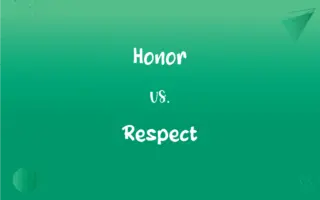Corrosion vs. Rusting: What's the Difference?
Edited by Aimie Carlson || By Harlon Moss || Updated on October 25, 2023
Corrosion is the deterioration of materials due to chemical reactions; rusting is the corrosion of iron and its alloys.

Key Differences
Corrosion is a broad term referring to the degradation of any material because of the reaction with its environment. This can occur to metals, polymers, and ceramics. Rusting, on the other hand, specifically relates to iron or its alloys undergoing corrosion.
As such, all rusting is corrosion, but not all corrosion is rusting. Corrosion can be due to various factors such as chemical exposure, galvanic reactions, and even microbial activity. Rusting, being a type of corrosion, is caused by the oxidation of iron in the presence of water and air.
The products formed during the rusting process are typically reddish-brown iron oxides. However, corrosion products can vary in color and composition depending on the material and the environmental factors it's exposed to.
Comparison Chart
Definition
Deterioration of materials due to chemical reactions.
Specific corrosion of iron and its alloys.
Materials Affected
Metals, polymers, ceramics, etc.
Only iron and its alloys.
ADVERTISEMENT
Resultant Compounds
Varies based on material and environment.
Reddish-brown iron oxides.
Cause
Chemical exposure, galvanic reactions, microbial activity, etc.
Oxidation of iron in presence of water and air.
Color Variation
Can vary widely depending on material.
Typically reddish-brown.
Corrosion and Rusting Definitions
Corrosion
Corrosion is the chemical degradation of materials due to environmental interactions.
The pipes showed signs of corrosion after years of exposure to moisture.
Rusting
Rusting refers to the specific corrosion of iron or its alloys when exposed to moisture.
Iron gates require maintenance to prevent rusting.
ADVERTISEMENT
Corrosion
Corrosion is the process where materials, often metals, break down due to chemical reactions.
Saltwater speeds up the corrosion of metals, leading to potential damage.
Rusting
Rusting is the process where iron reacts with oxygen to form iron oxides.
The old bicycle was left in the rain, leading to significant rusting.
Corrosion
Corrosion refers to the destruction or deterioration of metals as a result of chemical reactions.
Marine environments are often harsh and lead to increased rates of corrosion.
Rusting
Rusting is the oxidation of iron, producing reddish-brown iron oxides.
The rusting of the old car made it look worn and weathered.
Corrosion
Corrosion encompasses the various processes by which metals are oxidized in the environment.
Paint coatings are used to prevent corrosion on metal surfaces.
Rusting
Rusting signifies the decay of iron materials in the presence of oxygen and water.
The bridge showed signs of rusting along its iron beams.
Corrosion
Corrosion signifies the reaction of a substance with its environment leading to its degradation.
The statue's corrosion was evident with patches of discoloration.
Rusting
Rusting is the chemical breakdown of iron due to its reaction with oxygen and moisture.
Rusting nails can weaken the structure of wooden furniture.
Corrosion
The act or process of corroding.
Rusting
Any of various powdery or scaly reddish-brown or reddish-yellow hydrated ferric oxides and hydroxides formed on iron and iron-containing materials by low-temperature oxidation in the presence of water.
Corrosion
The condition produced by corroding.
FAQs
Can materials other than metals corrode?
Yes, corrosion can affect metals, polymers, and ceramics.
What colors are associated with corrosion?
Colors vary depending on the material and the type of corrosion, while rusting is typically reddish-brown.
Is rusting a fast or slow process?
Rusting can be both, depending on environmental conditions and the type of iron alloy.
Can all corrosion be called rusting?
No, only the corrosion of iron and its alloys can be termed as rusting.
What is corrosion?
Corrosion is the deterioration of materials due to chemical reactions with the environment.
Are there any health concerns associated with corrosion and rusting?
While most forms are not directly harmful, some corrosion products can be toxic, and rusting can introduce tetanus bacteria through wounds.
Is rusting a type of corrosion?
Yes, rusting is the corrosion of iron and its alloys.
How can corrosion be prevented?
Corrosion prevention methods include coatings, galvanization, and use of corrosion-resistant materials.
Is rusting reversible?
While the process itself isn't, rusted items can be treated to remove rust and prevent further rusting.
Can rusting affect the value of items?
Yes, rusting can reduce both functional and aesthetic value.
What causes corrosion?
Factors such as chemical exposure, galvanic reactions, and microbial activity can cause corrosion.
What causes rusting?
Rusting is caused by the oxidation of iron in the presence of water and air.
What's the end product of rusting?
The primary end product is reddish-brown iron oxide.
Are there tests to detect corrosion?
Yes, techniques like ultrasonic testing and visual inspection can detect corrosion.
Is rusting specific to any material?
Rusting is specific to iron and its alloys.
Are there industries specifically affected by corrosion and rusting?
Industries like marine, construction, and automotive are particularly vulnerable to corrosion and rusting.
Are there beneficial aspects to corrosion?
Some controlled corrosion processes, like patination, are used for decorative purposes.
How can rusting be prevented?
Keeping iron materials dry, applying paints, and using rust-resistant alloys can prevent rusting.
Are corrosion and rusting harmful?
Yes, both can weaken structures, damage aesthetics, and lead to equipment failure.
Is there a difference in the treatments for corrosion and rusting?
The basic principles are similar, but specific treatments vary based on the material and type of corrosion.
About Author
Written by
Harlon MossHarlon is a seasoned quality moderator and accomplished content writer for Difference Wiki. An alumnus of the prestigious University of California, he earned his degree in Computer Science. Leveraging his academic background, Harlon brings a meticulous and informed perspective to his work, ensuring content accuracy and excellence.
Edited by
Aimie CarlsonAimie Carlson, holding a master's degree in English literature, is a fervent English language enthusiast. She lends her writing talents to Difference Wiki, a prominent website that specializes in comparisons, offering readers insightful analyses that both captivate and inform.






































































